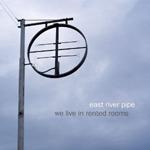
East River Pipe We Live In Rented Rooms
(Merge)
The limping campfire banjo that heralds the return of East River Pipe could have come from a record made 80 years ago. It’s a reminder that the most recent Great Depression might have begun as a financial crisis but has taken on a more literal meaning among those far enough down the social-economic ladder to feel the full effects.
These fly-paper narratives of people trapped by circumstances beyond their control or, in the case of Tommy Made A Movie, terminally weighted-down by their own inertia, have long been the preferred focus of lyricist Fred Cornog: Backroom Deals finds him trying and failing to come to terms with his role as a small cog in a machine that tips the scales away from him. The anonymous protagonist of The Flames Are Coming Back will never retrieve the coins that he threw in the wishing well. Tommy gets no further with his movie than staring at a sheet of yellow lined paper with a pencil in his hand, his failure to spark-off his own muse driving him to seek a disinterested connection with the dead-eyed star of an internet porno. The song, in sympathy with its subject, stops midway through the third verse, devolving into a minute of repetitive ambient synth, as if it has lost interest in itself.
While Cornog’s lyrics seldom stray far from the earth-bound purgatory of his dispossessed characters, his music seems to constantly strain against its modest budget, refusing to make a virtue of its lo-fi origins. The production may be unsubtle at times, with everything pushed to the front and occasionally too loud, but it’s distinctive.
A lot of these songs teeter on the brink of greatness only to run out of ideas, although, when they do achieve their full potential, the effect can be quietly heartbreaking: When You Were Doing Cocaine is a wistful 1970s piano ballad; nostalgia for a time spent fooling around with the partner of a drug-addled friend. If the chorus with its invitation to “come to the hills” seems to offer a way out and up, then lyrical hindsight reveals a doomed affair - a plateau on an otherwise downward spiral.
It’s this air of blank resignation and acknowledged defeat that characterises the album, lingering right up until the final notes. Three Ships is a reflective hymnal, the gentle, four note, ebb and flow of the keyboard, washed over by a distant choir. Cornog may have sworn to never live on his knees but it’s a meaningless gesture when the ships that sailed-in with such superficial promise, drift away having taken everything of value.
It might seem uncharitable to criticise a record for its subject matter but if the elements of the life being picked apart in these ten songs strike a personal chord – the depression, the personal disconnection, the lateral movement along the bottom rung of the ladder, from one minimum wage job and from one rented room to the next - then coming home and putting on an album like this is the equivalent of adding another 40 minutes to your daily grind.
Many of the songs here are too over-burdened by the minutiae of lives half lived to be transcendent, perpetually on the verge of something greater, yet too often falling just short of it. However, as with life, there are enough small moments of insight and beauty to make it worthwhile.
7 April, 2011 - 05:45 — Sam Redlark